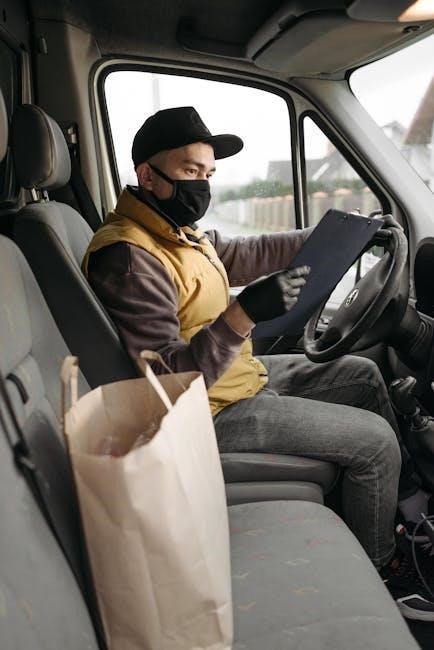The Florida CDL Manual is an official guide published by the Florida Department of Highway Safety and Motor Vehicles. It provides detailed information on commercial driver licensing, including rules, safety tips, and practical advice for operating commercial vehicles. The manual is available in multiple formats, including digital and audio versions, making it accessible to all learners. Regular updates ensure the content aligns with current laws and regulations, helping drivers stay informed and compliant. This comprehensive resource is essential for anyone seeking a commercial driver’s license in Florida, guiding them from application to maintaining their CDL.
1;1 Overview of the Florida CDL Manual
The Florida CDL Manual is a comprehensive guide designed to prepare individuals for obtaining and maintaining a Commercial Driver License. It covers essential topics such as road safety, vehicle inspection, and driving regulations. Available in formats like PDF and audio, the manual is accessible to all learners. Structured into sections like driving safely, pre-trip inspections, and basic vehicle control, it ensures a thorough understanding of commercial driving requirements. Regular updates align the content with current laws, making it an indispensable resource for both new and experienced drivers aiming to pass the CDL exam and operate safely.
1.2 Importance of the Florida CDL Manual
The Florida CDL Manual is a critical resource for anyone seeking a Commercial Driver License. It provides detailed information on state-specific laws, safety regulations, and driving practices. The manual ensures drivers understand their legal and safety responsibilities, helping them prepare for both written and practical exams. By studying the manual, drivers can significantly improve their chances of passing the CDL tests. It also serves as a long-term reference, aiding drivers in maintaining their licenses and staying compliant with Florida’s commercial driving requirements. This makes it an indispensable tool for safe and legal commercial vehicle operation.

Eligibility Requirements for a Florida CDL
Obtaining a Florida CDL requires meeting specific eligibility criteria, including age, residency, medical certification, and providing necessary documents. These requirements ensure only qualified drivers operate commercial vehicles safely.
2.1 Age Requirements
To apply for a Florida CDL, you must meet specific age requirements. For intrastate (within Florida) commercial driving, you must be at least 18 years old. For interstate (across state lines) driving, you must be at least 21 years old. Additionally, drivers over 70 years of age must undergo a medical examination to maintain their CDL eligibility. These age requirements ensure that commercial drivers are of legal age and physically capable of operating large vehicles safely. Always verify the latest guidelines in the Florida CDL Manual for any updates.
2.2 Legal and Medical Requirements
Obtaining a Florida CDL requires meeting specific legal and medical standards. Applicants must pass a vision test, submit proof of identity, and provide a valid Social Security number. A medical certification is mandatory, confirming the driver’s physical fitness to operate commercial vehicles. The Federal Motor Carrier Safety Administration (FMCSA) regulates medical requirements, including disqualification criteria for certain health conditions. Drivers must also pass background checks if applying for hazardous materials or school bus endorsements. Regular medical check-ups are required to maintain CDL eligibility, ensuring public safety and compliance with state and federal regulations.

Classes of Commercial Driver Licenses in Florida
Florida offers three CDL classes: Class A, B, and C, each catering to different types of commercial vehicles and driving roles. Specific requirements apply to each class.
3.1 Class A CDL
A Class A CDL in Florida is required to operate combination vehicles with a trailer weighing over 10,001 pounds. This includes tractor-trailers and other heavy-duty vehicles. Drivers must be at least 21 years old and pass specific knowledge and skills tests. The manual highlights the importance of this license for interstate operations and outlines the necessary training and medical requirements. It ensures drivers are prepared for the demands of handling large commercial vehicles safely and efficiently.
3.2 Class B CDL
A Class B CDL in Florida is required to operate heavy straight trucks, buses, and construction vehicles with a Gross Vehicle Weight Rating (GVWR) of 26,001 pounds or more. This license allows drivers to transport goods or passengers in vehicles that do not tow a separate trailer. Key requirements include being at least 21 years old, passing a knowledge test, and completing a skills test. The manual emphasizes the importance of this license for industries like construction and public transportation, ensuring drivers are qualified to handle large single-unit vehicles safely and efficiently.
3.3 Class C CDL
A Class C CDL in Florida is designed for operating small passenger buses, HazMat vehicles, or small trucks transporting hazardous materials. It covers vehicles with a GVWR of 26,001 pounds or less that are not combination vehicles. This license is essential for drivers in industries like public transportation or hazardous material transport. Endorsements are often required for specific operations, such as transporting passengers or hazardous materials. The manual emphasizes the importance of meeting all legal and medical requirements to ensure safe and compliant operation of Class C vehicles.

CDL Endorsements in Florida
CDL endorsements in Florida are special designations added to a commercial license, enabling drivers to operate specific vehicles like passenger buses, tankers, or HazMat carriers. Each endorsement requires additional knowledge and skills, tested through written exams, and is essential for careers in specialized transportation sectors.
4.1 Passenger Transport Endorsement
The Passenger Transport Endorsement in Florida allows CDL holders to operate vehicles designed to carry 16 or more passengers, including buses and shuttles. This endorsement is essential for drivers seeking jobs in public transportation, school buses, or private charter services. To obtain this endorsement, applicants must pass a written knowledge test covering safety protocols, emergency procedures, and passenger management. Additional training may be required for specific roles, such as school bus drivers. This endorsement ensures drivers are prepared to handle the unique challenges of transporting passengers safely and efficiently, making it a critical component for career opportunities in the transportation sector.
4.2 School Bus Endorsement
The School Bus Endorsement is a specialized certification for CDL holders in Florida, enabling them to transport students. It requires a rigorous background check, a written test, and training on safety protocols for children. Drivers must demonstrate expertise in loading/unloading procedures, emergency evacuations, and handling special needs students. This endorsement is mandatory for operating school buses and ensures drivers meet strict safety standards to protect children. It combines theoretical knowledge with practical skills, making it essential for those pursuing careers in student transportation.
4.3 Tanker Endorsement
The Tanker Endorsement is required for drivers operating vehicles designed to transport liquids or gases in bulk. This endorsement ensures drivers can safely manage the unique challenges of tanker vehicles, such as cargo surge and rollover risks. To obtain this endorsement, applicants must pass a written test and demonstrate proficiency in handling tanker-specific safety practices. The endorsement is critical for those seeking careers in hauling bulk liquids or gases, as it emphasizes safe loading, unloading, and transit procedures to prevent accidents and environmental hazards.
4.4 HazMat Endorsement
The HazMat Endorsement is required for drivers transporting hazardous materials. It ensures compliance with federal and state regulations, focusing on safety and proper handling procedures. Applicants must pass a written test, undergo a background check, and complete fingerprinting. The endorsement emphasizes safe transportation practices, emergency response protocols, and adherence to placarding and packaging requirements. This endorsement is critical for drivers involved in hauling hazardous substances, ensuring public safety and environmental protection. Regular updates in the manual reflect changing regulations, making it essential for HazMat drivers to stay informed and compliant.
4.5 Air Brakes Endorsement
The Air Brakes Endorsement is required for drivers operating vehicles equipped with air brake systems. This endorsement ensures understanding of air brake components, operation, and safety checks. Topics covered include the function of air brake chambers, brake pedals, and air pressure gauges. Proper inspection and maintenance procedures are emphasized to prevent malfunctions. Drivers must pass a written test demonstrating knowledge of air brake systems. This endorsement is critical for safe operation of vehicles with air brakes, ensuring adherence to federal and state regulations. Regular updates in the manual keep drivers informed of the latest safety standards and operational best practices.
The Florida CDL Study Guide
The Florida CDL Study Guide is a comprehensive resource for commercial driver license applicants. It covers essential topics like road rules, safety practices, and vehicle operation. Available in digital and audio formats, it offers flexible learning options. Regular updates ensure the guide reflects current laws and regulations. This guide is indispensable for preparing for CDL tests, providing clear explanations and practical examples to help applicants succeed.
5.1 Structure of the Florida CDL Handbook
The Florida CDL Handbook is organized into clear, logical sections for easy navigation. It begins with an introduction, followed by eligibility requirements, CDL classes, endorsements, and safe driving practices. The manual uses headings and subheadings to break down complex information into digestible parts. Each chapter focuses on specific topics, such as pre-trip inspections, vehicle control, and traffic laws. Bullet points, diagrams, and examples are included to enhance understanding. The structure ensures readers can quickly locate relevant information, making it an efficient study tool for CDL applicants.
5.2 Key Topics Covered
The Florida CDL Handbook covers essential topics to prepare drivers for commercial licensing. It includes sections on road safety, pre-trip inspections, and vehicle control. The manual details CDL classifications, endorsements, and medical requirements. It also addresses traffic laws, defensive driving, and managing space and speed. Additional topics include hazardous materials transport, tanker operations, and air brake systems. The handbook provides practical advice for handling emergencies and adverse weather conditions. By focusing on both legal and safety aspects, it ensures drivers are well-prepared for the responsibilities of commercial driving. Regular updates keep the content aligned with current regulations.
Pre-Trip Vehicle Inspection
The Florida CDL Manual emphasizes the importance of pre-trip inspections to ensure vehicle safety and compliance with regulations. Drivers must check tires, brakes, lights, and fluid levels before operation.
6.1 Steps for Conducting a Pre-Trip Inspection
Conducting a pre-trip inspection involves checking the vehicle’s exterior and interior systems. Start with the exterior: inspect tires for wear and proper inflation, wheels for damage, brakes for leaks or damage, lights for functionality, and the trailer for secure coupling. Inside the cab, check the dashboard warning lights, mirrors for proper adjustment, and seatbelt functionality. Ensure all safety equipment, such as fire extinguishers and reflectors, are present and operational. Document any issues and address them before driving. These steps ensure the vehicle is roadworthy and safe to operate, adhering to Florida CDL regulations and promoting highway safety.
6.2 Importance of Vehicle Safety Checks
Vehicle safety checks are crucial for ensuring road safety and preventing mechanical failures. Regular inspections help identify potential issues before they cause accidents, protecting both the driver and other road users. They also ensure compliance with legal requirements, avoiding penalties and maintaining CDL validity. By conducting thorough checks, drivers demonstrate professionalism and responsibility, contributing to safer and more efficient commercial operations. These inspections are vital for maintaining the integrity of the vehicle and ensuring the safety of everyone on the road.
Safe Driving Practices
Safe driving practices are essential for CDL holders, emphasizing defensive techniques, proper space management, and adherence to traffic laws to ensure road safety and reduce accidents effectively.
7.1 Defensive Driving Techniques
Defensive driving techniques are critical for CDL holders to anticipate and respond to potential hazards. This includes maintaining a safe following distance, scanning the road ahead, and being aware of other drivers’ actions. The Florida CDL Manual emphasizes staying alert, avoiding distractions, and using mirrors effectively. Drivers should also be prepared to react to emergencies by keeping a clear path to maneuver. By adopting these practices, commercial drivers can significantly reduce the risk of accidents and ensure the safety of themselves and others on the road. Regular practice and adherence to these techniques are vital for maintaining a safe driving record.
7.2 Managing Space and Speed
Managing space and speed is crucial for commercial drivers to maintain control and safety on the road. The Florida CDL Manual advises drivers to adjust their speed according to road conditions, traffic, and weather. Proper spacing ensures enough time to react to unexpected situations, while smooth acceleration and braking help avoid sudden movements. Staying alert to surrounding vehicles and adjusting speed to maintain a safe distance is essential. This practice minimizes the risk of accidents and enhances overall safety for both the driver and other road users. Proper space and speed management are key to responsible commercial driving.

CDL Written Knowledge Tests
The Florida CDL Manual outlines the written knowledge tests required for obtaining a commercial driver’s license. These tests cover general knowledge and endorsement-specific topics, ensuring drivers understand safety regulations, vehicle operations, and traffic laws. The manual serves as the primary study resource for these exams, with questions directly based on its content. Passing these tests is a critical step toward earning a CDL and demonstrates a driver’s knowledge and readiness for safe commercial vehicle operation.
8.1 General Knowledge Test
The General Knowledge Test is a fundamental requirement for obtaining a Florida CDL. It covers essential topics such as safe driving practices, vehicle inspection procedures, and traffic laws. The test ensures drivers understand basic operation principles, hazard perception, and emergency protocols. Questions are based on the Florida CDL Manual, emphasizing critical safety information. A passing score demonstrates a driver’s ability to operate a commercial vehicle safely and responsibly. This test is mandatory for all CDL applicants and serves as the foundation for additional endorsement-specific exams.
8.2 Endorsement-Specific Tests
Endorsement-specific tests are required for drivers seeking specialized certifications, such as Passenger Transport, School Bus, Tanker, HazMat, or Air Brakes. These exams assess knowledge and skills for handling specific types of cargo or vehicles. The tests are in addition to the General Knowledge Test and are based on detailed information in the Florida CDL Manual. Each endorsement requires a separate written and, in some cases, practical exam. Passing these tests ensures drivers can safely operate specialized vehicles and cargo, adhering to federal and state regulations. Studying the manual thoroughly is essential for success in these exams.
CDL Skills and Driving Tests
The Florida CDL skills and driving tests assess a driver’s ability to operate a commercial vehicle safely. The tests include pre-trip inspection, basic vehicle control, and on-road driving. These evaluations ensure competence in handling the vehicle under various conditions, adhering to traffic laws, and maintaining safety standards. Proper preparation and practice are essential for success, as these tests are critical for obtaining a Florida CDL.
9.1 Pre-Trip Inspection Test
The pre-trip inspection test evaluates a driver’s ability to identify and report vehicle defects. Conducted before starting the engine, it includes a walk-around inspection of tires, brakes, lights, and mirrors. Drivers must check for proper function and safety compliance. Once inside the cab, they start the engine and test vital systems like brakes, signals, and gauges. This step ensures the vehicle is roadworthy and safe to operate. The test assesses both knowledge of inspection procedures and the ability to identify potential safety hazards. Proper preparation and attention to detail are crucial for success in this phase of the CDL skills test.
9.2 Basic Vehicle Control Test
The Basic Vehicle Control Test assesses a driver’s ability to maneuver a commercial vehicle safely and precisely. Conducted in a controlled environment, it evaluates skills like forward and backward movement, turning, and stopping. Drivers must demonstrate control during exercises such as straight-line backing, offset parking, and alley docking. The test focuses on the driver’s ability to position the vehicle accurately and maintain safety while performing these maneuvers. Proper use of mirrors, signals, and braking techniques is essential. Mastery of these fundamental skills is critical for safe and efficient operation of a commercial vehicle on the road.
9.3 On-Road Driving Test
The On-Road Driving Test evaluates a driver’s ability to operate a commercial vehicle in real traffic conditions. It assesses skills such as turning, merging, and maintaining proper lane position. Drivers must demonstrate adherence to traffic laws, including right-of-way rules and speed limits. The test also observes the driver’s ability to safely interact with other road users, such as pedestrians and other vehicles. Safe braking, acceleration, and use of signals are key components. This test ensures that drivers can apply their knowledge and skills in dynamic, real-world scenarios, confirming their readiness to operate commercially.

Maintaining Your CDL
Maintaining your CDL requires periodic renewal, updating medical certifications, and adhering to Florida’s regulations. Regular checks ensure compliance with state and federal laws, keeping your license active and valid.
10.1 Renewal Process
The renewal process for a Florida CDL involves submitting an application, paying fees, and providing updated documentation. Renewal can be done online, in person, or by mail, typically within 12 months of expiration. Drivers must present proof of identity, residency, and medical certification. A vision test may also be required. The Florida Department of Highway Safety and Motor Vehicles (FLHSMV) notifies drivers of renewal eligibility. Timely renewal ensures uninterrupted commercial driving privileges and avoids penalties. The official Florida CDL manual provides detailed instructions for a smooth renewal process.
10;2 Medical Certification Requirements
CDL holders in Florida must meet federal and state medical standards to ensure public safety. A valid Medical Examiner’s Certificate, issued by an FMCSA-certified examiner, is required. The certification process involves a physical exam assessing vision, blood pressure, and physical ability to operate a commercial vehicle safely. Certificates are typically valid for up to two years, depending on health conditions. Drivers must submit their medical certificate to the FLHSMV and keep it updated. Failure to maintain medical certification can result in CDL suspension. The Florida CDL manual provides detailed guidelines on medical requirements and exemptions. Stay informed to avoid penalties and maintain compliance.

Florida CDL Manual Updates
The Florida CDL Manual is regularly updated to reflect new regulations and safety guidelines. The 2023 and 2025 editions include updated rules, expanded safety sections, and clarified endorsement requirements, ensuring drivers stay compliant with current standards.
11.1 2023 Florida CDL Manual Updates
The 2023 Florida CDL Manual introduced updated regulations and enhanced safety guidelines. Key changes included revised rules for endorsements, such as HazMat and tanker endorsements, and expanded sections on defensive driving techniques. The manual also clarified medical certification requirements and added detailed information on pre-trip inspections. Additionally, the 2023 edition emphasized the importance of staying updated on federal and state laws, ensuring drivers are well-prepared for both written and practical exams. These updates aim to improve road safety and compliance with current industry standards.
11.2 2025 Florida CDL Manual Updates
The 2025 Florida CDL Manual includes new safety protocols and updated regulations. It features enhanced sections on endorsements, such as passenger transport and school bus requirements. The manual now offers interactive digital formats, including audio and AI-assisted study tools. Additionally, it includes expanded training modules for HazMat and tanker endorsements. These updates aim to align with federal standards and address industry advancements. The 2025 edition also emphasizes job market growth in trucking, encouraging new drivers to pursue CDL certification. These changes ensure the manual remains a vital resource for safe and compliant commercial driving in Florida.
Additional Resources
Find Florida DMV office locations and CDL training schools. Utilize online platforms like Driving-Tests.org for practice exams and study tools to aid in CDL preparation and success.
12.1 Florida DMV Office Locations
Locating a Florida DMV office is straightforward with the official FLHSMV website. It provides a comprehensive list of offices statewide, allowing you to find the nearest location by city or county. Each office offers various services, including CDL applications, renewals, and knowledge tests. Some offices may require appointments, while others offer walk-in services. Visit the FLHSMV website for detailed office hours, contact information, and specific services provided. This resource ensures you can efficiently complete your CDL-related tasks. Using the website’s search tool helps streamline your visit, saving time and effort. Additionally, many offices are equipped to handle commercial driver needs, ensuring a smooth process for applicants. Staying informed through the official website guarantees you have the most up-to-date information, avoiding unnecessary delays. By planning your visit in advance, you can ensure all required documents and fees are prepared, making the process as efficient as possible. This convenient access to DMV locations is a key part of obtaining and maintaining your CDL in Florida.
12.2 CDL Training Schools in Florida
Florida boasts numerous CDL training schools, many funded by state programs to expand capacity. These institutions, such as State College of Florida and Broward College, offer comprehensive training programs tailored to CDL requirements. They cover both knowledge and skills tests, ensuring students are well-prepared for their exams. Additionally, these schools often provide specialized training for endorsements like HazMat and tanker operations. With a focus on addressing the truck driver shortage, these programs aim to produce skilled and safe commercial drivers. Enrolling in a reputable CDL training school in Florida is a reliable path to securing your commercial driver’s license and entering the industry with confidence.
